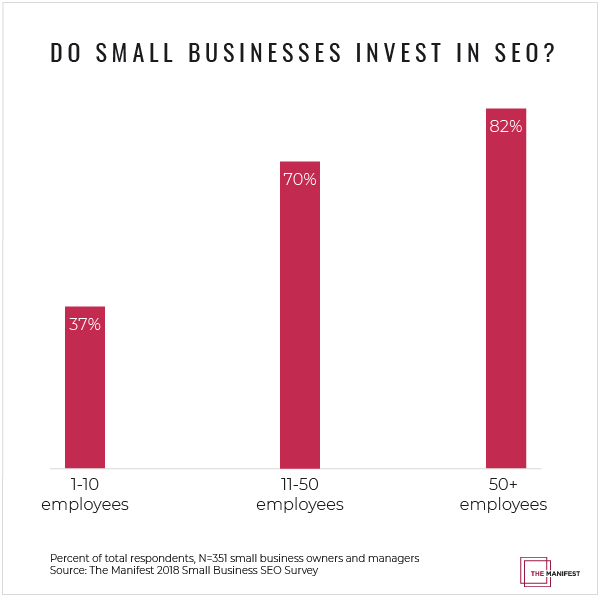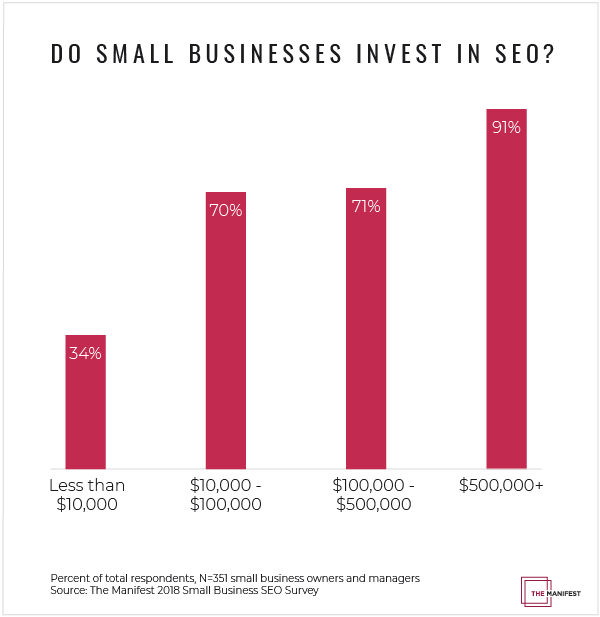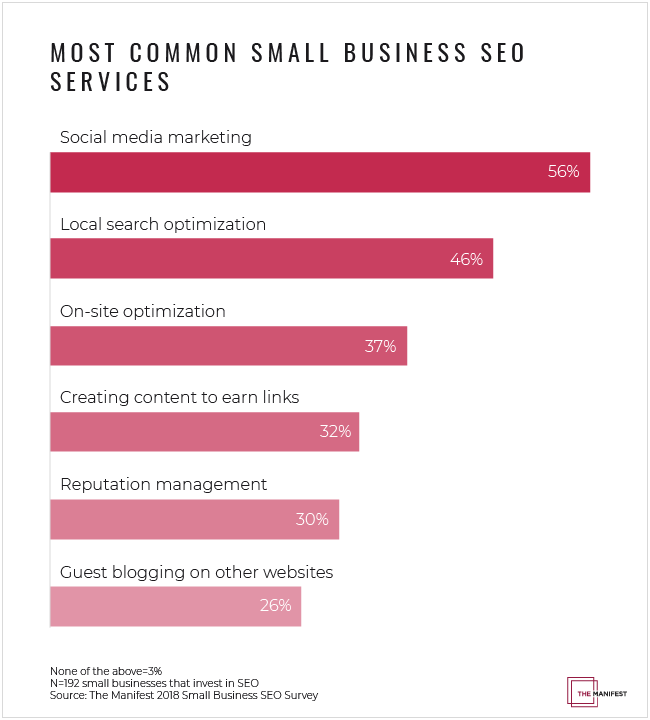Factors That Determine Small Business SEO Investment

Factors That Determine Small Business SEO Investment
The number of small businesses that invest in SEO and PPC advertising increases with company size and marketing budget. Marketing budget in particular impacts whether small businesses invest in SEO and the depth of their efforts: Over 90% of small businesses with a marketing budget of more than $500,000 invest in SEO.
Small businesses that invest in SEO tend to have more employees and maintain larger marketing budgets.
The Manifest surveyed over 350 small business owners and managers to determine whether they invest in SEO and pay-per-click (PPC) advertising.
We found that the size of a small business’ marketing budget determines its likelihood to invest in SEO.
Marketing budget and the resources small businesses turn for SEO, such as in-house staff and SEO agencies, also affect the depth of a small business' SEO strategy. This includes:
- The services it includes in its campaigns
- How likely it is to invest in paid search
- The metrics it uses to determine success
Small businesses can use this report to identify opportunities and adjust their SEO strategies accordingly.
Our Findings
- Company size is a strong indicator of how likely a small business is to invest in SEO. A majority (82%) of small businesses with over 50 employees invest in SEO, compared to only 37% of small businesses with 10 employees or fewer.
- Marketing budget impacts how small businesses invest in SEO. Nearly all (91%) small businesses with a budget of over $500,000 invest in SEO. Comparatively, one-third (34%) with a budget of $10,000 or less use SEO.
- Small businesses with more employees and higher marketing budgets often partner with SEO experts. Half (50%) of businesses with 50 or more employees hire an SEO consultant.
- Nearly three-fourths (74%) of small businesses with marketing budgets of at least $100,000 partner with an SEO consultant or agency.
- Small businesses that partner with SEO consultants and agencies measure on-site engagement (21%) to determine the success of their SEO.
- Surprisingly, a small business’ size, marketing budget, or preferred resource does not impact the SEO services it includes in its strategy. Social media marketing (56%) is the most common SEO service among small businesses, regardless of external factors.
Small Business SEO Investment Increases With Company Size
The larger a small business is, the more likely it is to invest in SEO and PPC.
A majority (82%) of small businesses with 50 or more employees invest in SEO as part of their digital marketing efforts.
In addition, 74% of this group invests in PPC advertising.

In contrast, small businesses with 10 employees or fewer are the least likely (37%) to invest in SEO. Similarly, only 30% of this group invests in PPC.
Kevin Tash, CEO of Tack Media, an internet marketing agency based in Los Angeles, says small businesses with fewer employees focus on customers within their local radius, which may deter them from investing in search marketing.
“If you are a small, local business, you can only find so much relevance outside of a radius,” said Tash. “If you are a larger company, you can achieve a voice that has more reach and relevance.”
So, smaller firms may have less incentive to invest in SEO, given the limits of their services outside their locality.
That being said, SEO services like local search optimization still benefit small businesses that operate mostly within their local radius.
In particular, if small businesses recognize that their peers likely don’t invest in SEO, they can exploit this market gap to their advantage.
Lisa Hirst Carnes, co-founder and marketing director for ArcStone, a design and marketing agency in Minneapolis, encourages small businesses to conduct a competitor analysis before investing in SEO.
“Since your competition is most likely not investing in SEO, I'd urge small businesses take the plunge. Because your competition isn't there, there's most likely low hanging fruit that you can leverage and find success,” Hirst Carnes said.
Through competitor analysis, small businesses can adjust their SEO strategy to target keywords with little competition and create competition for spaces where their rivals operate.
Marketing Budget Impacts Whether Small Businesses Invest in SEO
Similar to company size, the larger a small business’ marketing budget, the more likely it is to invest in SEO.
Nearly all (91%) small businesses with a marketing budget of $500,000 or more invest in SEO.
However, only one-third (34%) of small businesses that spend $10,000 or less on marketing per year will invest in SEO in 2018.

In addition, more than three-fourths (77%) of small businesses with a budget of more than $500,000 invest in PPC advertising.
Josh Rubin, owner of Post Modern Marketing, a Sacramento, Calif.-based digital marketing and design agency, says that small businesses with high-value leads are more likely to consider SEO as a worthwhile investment.
“If the value of one lead is very high, you’re a lot more apt to take a long-term risk with SEO,” said Rubin.
For example, a company that sells a high-ticket item, such as industrial manufacturing equipment, highly values each of its leads, given the revenue generated from each sale. For this sort of company, SEO produces substantial value.
On the other hand, a company that sells socks may not benefit from SEO because of the low profit margins that result from each of its sales. For these types of companies, investment dollars need immediate return, so a long-term investment like SEO may not make financial sense.
Investing in SEO Provides Validation for Small Businesses
Small businesses that invest in SEO earn legitimacy from customers.
Investing in SEO ensures your small business is available for customers to locate and research online. This is especially important because 70% of customers begin their buying process through search engines.
Given this reality, making a positive impression with potential customers through search engines is crucial. Tash refers to this benefit as “social validation.”
“SEO is for social validation: 50% of people check your social media and web presence before buying a product from you. If you are nowhere to be found, people find that odd,” Tash said.
If your company is difficult to find through a web search or social media, customers in the digital economy may be skeptical about your company.
Small Businesses With Large Marketing Budgets Partner With SEO Experts
Small businesses with more employees and larger marketing budgets frequently partner with SEO experts, such as SEO companies and consultants, to help format and execute their campaigns.
Approximately three-fourths (74%) of small businesses with a budget of more than $500,000 partner with an SEO agency or consultant.
This finding reflects the simple fact that quality SEO services are expensive, according to Rubin.
“Good SEO consultants cost money. If your [small business] wants the best person for SEO, you’re not going to hire someone in-house because the best SEOs don’t work in-house. They work in their own firm,” said Rubin.
SEO experts help small businesses manage their SEO investments. In particular, an SEO company provides a multifaceted skill set that small businesses can leverage to achieve comprehensive SEO success.
“There’s a vast number of skill sets necessary [for SEO]. It’s hard to get individuals on [an internal] team to go deep in all of those areas,” said Carnes. “Enlisting a partner for their support is oftentimes more effective because you have more depth in a variety of areas.”
Given the various factors that affect a site’s search rankings, SEO companies can provide comprehensive SEO services that small businesses may not be able to maintain in-house.
Small Businesses With Small Budgets Keep SEO In-House
Small businesses with fewer employees and limited marketing budgets depend on in-house teams for SEO.
Nearly half (47%) of small businesses with 10 employees or fewer use in-house resources for SEO.

Joe Robison, owner of Bucket List Events, an Austin, Texas-based travel agency, falls within this category. Given its budget, Bucket List Events depends on its in-house team and occasional freelancers for SEO.
“Since we're under 10 people, we use internal staff and freelancers to augment our work,” Robison said. “We are okay spending more on marketing if we have a big event coming.”
For Bucket List Events and other companies of this size and budget, hiring an SEO company isn’t feasible, financially or logistically. The only reason to hire external help is for an event, which may require a marketing push that an internal team can’t handle alone.
Small Businesses Favor Social Media Marketing, Regardless of External Factors
Small businesses invest in social media marketing more than any other SEO service, regardless of their size, marketing budget, or preferred resource.
Over half (56%) of small businesses use social media marketing to support their SEO compared to 46% that invest in local search optimization.

Social media marketing is familiar, and for small businesses with little experience with SEO, it may be the easiest SEO service to identify.
“Social media is definitely the most familiar [among SEO services],” said Rubin. “Small businesses know what social media marketing is. Backlink auditing? They don’t know. On-site optimization? Same thing.”
So, while other common SEO services such as local search optimization or reputation management may be effective, their unfamiliarity may deter some small businesses from investing.
Small Businesses With Limited Budget Measure Simpler SEO Metrics
Small businesses that rely on in-house teams for SEO use simpler metrics to determine the success of their efforts.
This group measures leads and conversions (26%) and site traffic generated from search engines (21%) the most.
These metrics are the easiest to measure, according to Mike Anderson, CEO of
At the initial awareness stage of the conversion funnel, customers discover your company through a search query. Customers at this stage are considering both whether your product/service is relevant to them and who the best provider is for them.
As customers advance to the interest stage, they engage with your site content. Small businesses targeting customers at this stage should create content meant to engage customers and hopefully drive them to decision and action stages, where they actually convert on your product or service.
Small businesses that measure on-site engagement can determine the type of content that drives engagement and advances customers through the conversion funnel.
Using this insight, your small business can create content that appeals to your target customers who are further in the marketing funnel. Through these efforts, you can increase the chances that they eventually convert on your product or service.
Company Size and Marketing Budget Impact How Small Businesses Invest in SEO
Small businesses with more employees and larger marketing budgets are the most likely to invest in SEO and PPC.
Conversely, small businesses with 10 employees or fewer or with a marketing budget under $10,000 rarely invest in SEO.
A small business’ marketing budget also impacts the metrics it uses to measure the success of its SEO efforts. In particular, small businesses with limited marketing budgets measure their success using metrics that are simpler to measure, such as keyword rankings and site traffic.
However, small businesses that partner with SEO experts – SEO agencies and consultants – tend to measure their success using metrics that give insight to where their customers are in the conversion funnel. Specifically, approximately one-fifth of businesses that partner with an SEO agency measure how their users engage with their on-site content.
Regardless of external factors, small businesses favor social media marketing the most among SEO services. This is likely due to their familiarity with social media over more technical SEO services such as on-site optimization or local search.
Ultimately, through investing in SEO, small businesses can achieve “social validation” from audiences who are able to locate and research a company through search.
Given the role of search engines in the modern buyer’s journey, if a business does not appear on search results, customers will be wary of its legitimacy.
About the Survey
The Manifest surveyed 351 small business owners and managers to determine how they invest in SEO.
Over three-fourths (78%) of the respondents work at organizations with 50 or fewer employees.
The gender breakdown of respondents is fairly even: Just over half (54%) are women; the remaining 46% are men.
